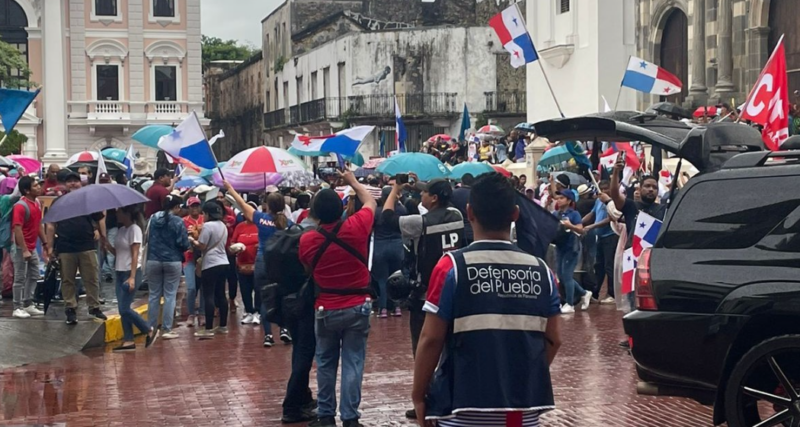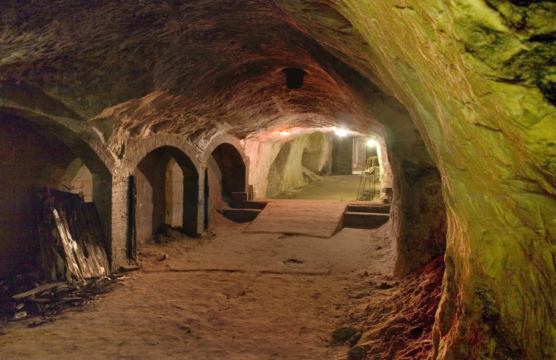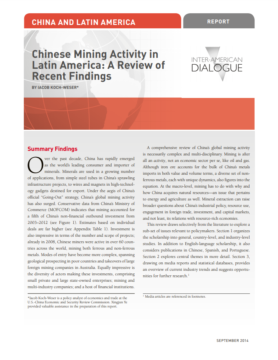As Mining Sector Takes Off, Colombia Must Take Care
Colombia is in the midst of a mining boom. The challenge for President Santos is to capitalize on the sector’s promise.
A Daily Publication of The Dialogue
Panamanian President Laurentino Cortizo on Nov. 3 signed into law an indefinite moratorium on new mining concessions following weeks of protest over a contract that was granted to Minera Panamá, a local subsidiary of Canadian mining company First Quantum. The new law also prohibits the renewal of existing concessions, but it still allows Minera Panamá to operate the copper mine in Colón province for 20 years, with a potential extension for another 20 years. What concerns are at the root of the protests? How well has Cortizo’s administration navigated the public pressure brought on by the controversy and demonstrations? What will the moratorium mean for business interests and the mining sector in Panama as well as for the country’s economy?
Joaquín Jácome Diez, partner at Jácome & Jácome: “What started originally as a legitimate protest against the Minera Panamá contract law—by wide sectors of the population claiming the contract was unconstitutional, abusive and harmful to the environment—evolved into a social eruption against the Cortizo administration and the National Assembly. Protesters were mostly young people summoned by social media, believing it was their patriotic duty to participate in a civilized way. Once the administration enacted a law declaring a moratorium on metallic mining in the country and Minera Panamá’s contract law was challenged before the Supreme Court, demonstrations should have had ended. According to experts in constitutional law, the Minera Panamá contract law cannot be canceled by another law, but only by the Supreme Court of Justice. The country is expecting this ruling by next week. However, radical groups have kept the country shut down for more than three weeks, causing great harm to the economy and the well-being of the silent majority of the population. Inaction by the administration in establishing law and order throughout the country has created a power vacuum, enabling these radical groups to hijack the country. It is clear that what these radical actors (who are most likely internationally financed) are pursuing has nothing to do with mining but rather destabilization of our country. This situation is of great concern to most Panamanians. It is most likely that the Supreme Court ruling will declare the contract law unconstitutional and the republic will be forced to face international arbitration. As a consequence of the current situation, the moratorium and possible international arbitration, Panama as a friendly place to foreign direct investment will suffer greatly, and negative economic repercussions are still undetermined.”
Alejandro Valerio, founder of Valerio Consulting Group: “The concerns at the root of the protests are not only about the mining concession, as can be inferred by their scale. Indeed, the protests that have recently rocked Panama showcase that it is not only about environmental rights, mining or the country’s economic model, but also about the underlying problems affecting the bread-and-butter issues of Panamanians, such as inequality, corruption and the quality of public services. The Cortizo administration is in a difficult balancing act composed by the state’s economic needs and popular demands. Regarding the former, Cortizo understands that Panama needs the revenue from the mining project, Cobre Panamá, as it has been a lifeline for the country’s recovery after the Covid-19 shock that sank its GDP by 18 percent in 2020. Cobre Panamá contributes 4 percent of Panama’s GDP and roughly 75 percent of its export goods, thus a drastic halt of its operations could ignite an economic maelstrom that might cause further governance instability. Also, rolling back the legislation that extends the concession of First Quantum Minerals (FQM), will not only trigger a complex international arbitration procedure that Panama is likely to lose, but also weaken the country’s attractiveness to lure more foreign direct investment amid a complex international juncture. The fact the protests have continued despite conciliatory efforts from Cortizo’s government indicates the moratorium will not appease public anger, hence putting more pressure on the Supreme Court to declare the FQM contract unconstitutional as the most feasible offramp of the crisis, at least in the short-term.”
Graham A. Davis, professor emeritus of economics and business at the Colorado School of Mines: “Mining companies and their financial backers are exposed to significant risks when investing in efforts to find and develop mining properties like Cobre Panamá. They seek countries with a steady and secure set of mining laws and codes. Panama’s rapidly changing legal landscape will likely deter future investments in mining projects in Panama, as investors will instead seek to invest in more stable jurisdictions. The effect of this reduction in investment on Panama’s economy will depend on whether the gap is filled by other investment activities, such as in developing ecotourism or expanded canal services.”
Orlando J. Pérez, professor of political science at the University of North Texas at Dallas: “The National Assembly passed the Minera Panamá concession in record time and with little debate. Some have speculated about the possibility that illicit payments were made in exchange for its approval. The protests, which environmental groups initially led, soon mushroomed into a national movement including labor unions, students, educators, civil society groups and regular citizens, many of whom have never before protested. The underlying causes of the protests are an accumulation of grievances, ranging from the cost of living, inequality, rising crime and endemic corruption. All of this is exacerbated by an administration that has run out of steam and lacks credibility. Apparently, it is incapable of leading a national dialogue to resolve the issue. Cortizo first seemed to ignore the protests. Then he sought a popular referendum and decreed a moratorium on future mining. Finally, under intense pressure, the president abandoned the referendum idea and sought legislation to codify the moratorium. However, protests have continued affecting the supply of goods and services across the country. Business groups estimate that there are nearly $80 million in losses daily. The resolution of the conflict now seems to be in the hands of the Supreme Court, which is weighing the constitutionality of the mining concession. Even if declared unconstitutional, it is almost certain that Panama and the mining company will be involved in international arbitration for years. The effects on next year’s presidential elections are still to be determined. But what is clear is that this issue has made Vice President José Carrizo’s chances of winning next year’s presidential election even more remote.”
 The Latin America Advisor features Q&A from leaders in politics, economics, and finance every business day. It is available to members of the Dialogue’s Corporate Program and others by subscription.
The Latin America Advisor features Q&A from leaders in politics, economics, and finance every business day. It is available to members of the Dialogue’s Corporate Program and others by subscription.
Colombia is in the midst of a mining boom. The challenge for President Santos is to capitalize on the sector’s promise.
Colombia has to remain competitive with other major producers such as Mexico to attract needed investment in extractive industries.
China has rapidly emerged as the world’s leading consumer and importer of minerals.
 Demonstrators in Panama have taken to the streets for weeks over a major copper ,mining project
Demonstrators in Panama have taken to the streets for weeks over a major copper ,mining project

